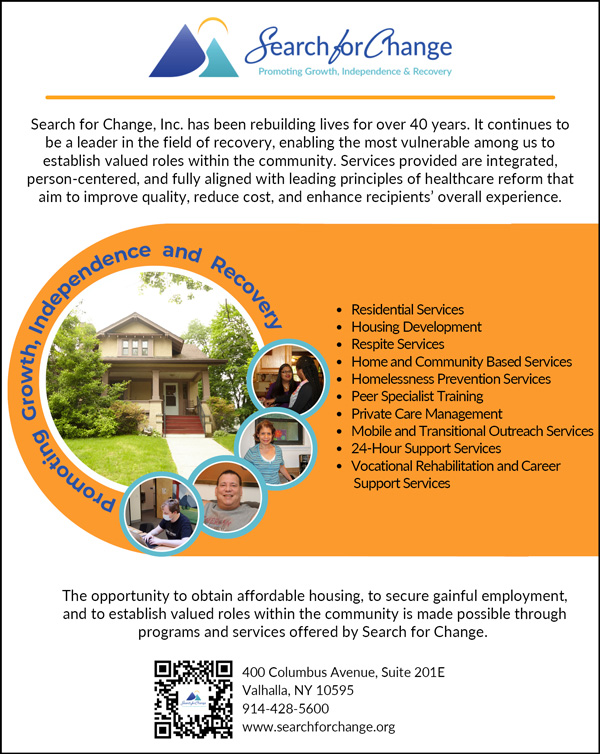Family members of those with serious behavioral health conditions often encounter innumerable obstacles in the pursuit of effective treatment and other essential services for their loved ones. Navigating a byzantine network of resources, many of which entail restrictive eligibility criteria and extensive waitlists, is exceptionally challenging for even the most resilient and steadfast among us. Individuals commonly assume this responsibility while coping with the emotional distress that follows the revelation a son, daughter, sibling, parent, or spouse has received a potentially grave diagnosis for which the course of treatment and prognosis are anything but certain. In short, our behavioral healthcare system imposes an onerous burden on individuals during periods of acute vulnerability.

Ashley Brody, MPA, CPRP
A wealth of research has validated families’ experiences and suggests various improvements to the existing system of care are warranted. One comprehensive review of literature on the subject revealed common denominators that would resonate with many. It found family members frequently suffer from significant stresses, experience “moderately high levels of burden,” and receive insufficient assistance from mental health professionals (Saunders, 2003). Another study found more than a third (35%) of individuals have been adversely affected by a family member’s mental health condition, and it revealed significantly greater levels of distress among those who provide care for a family member with a mental illness (Pearson, 2015). Moreover, these findings are not unique or even limited to the United States. An analysis of family experiences in other Western nations revealed common themes irrespective of geographic, cultural, or sociopolitical considerations. For instance, multiple studies suggest behavioral healthcare providers and the institutions with which they are affiliated perpetuate family members’ distress. One investigation found family members frequently cited their relatives’ psychiatrists as a source of stigma that exacerbated their distress (Angermeyer, et al., 2003), and another found family members desired more collaboration and cooperation from their relatives’ mental health professionals (Saunders & Byrne, 2002). A focus group with relatives of individuals diagnosed with schizophrenia or bipolar disorder revealed similar sentiments among participants, many of whom described their relatives’ therapists as critical and unsupportive (Rose, 1998).
It would be uncharitable (and inaccurate) to conclude such experiences are universal, however. One study indicated family members benefit from alternative approaches that incorporate emerging evidenced-based and recovery-oriented care for individuals with mental health conditions. One of these approaches (i.e., the “Clubhouse Model”) facilitates participants’ involvement in “normalized” pursuits that include socialization and a variety of purposeful activities aligned with their goals and interests. Relatives of these participants frequently report positive experiences and derive considerable support from the broader Clubhouse community (Pernice-Duca, et al., 2015). Another exploration of family members’ experiences suggests significant minorities are pleased with the support they received from their relatives’ healthcare professionals. Approximately one-third (39%) of family members were satisfied with the support they received, and a similar percentage (38%) were satisfied with the quality of communication they maintained with their relatives’ treatment providers (Vermeulen, et al., 2015).
These themes emerged through my recent dialogue with the parents of a young man who lived with a serious mental illness and substance use disorder for several years until he succumbed to the Coronavirus. “Sarah” and “Andrew” witnessed some of the best and worst our behavioral healthcare system had to offer to their son “Jason.” They were kind enough to share insights borne of difficult experiences that culminated in the incalculable grief that attends the premature death of a child. I am deeply indebted to them for their candor and generosity. Their experiences are not unlike those of other families as described in the research literature, and the failings of our system coupled with the enduring pain of a grievous loss might have engendered considerable cynicism or animus. This did not occur. Sarah and Andrew maintain an exceptionally thoughtful and nuanced view of our system and its response to their son’s illness. They remain cognizant of its deficiencies, appreciative for its strengths, and optimistic certain improvements might be realized in time. They are also grateful for the assistance their family received and how it lightened what could have been an unbearably heavy load.
Sarah believes Jason was fortunate to encounter a compassionate and knowledgeable treatment team following the onset of his illness whose members recognized he would require a comprehensive array of services in order to manage his symptoms and to achieve progress in his recovery. This does not suggest she and her husband are fully satisfied with the behavioral healthcare system. They were left deeply dissatisfied and disappointed at times, and they readily identify innumerable areas for improvement. Nevertheless, they recognize Jason’s initial encounter with well informed and responsive professionals operating under the auspices of a reputable behavioral healthcare institution was auspicious (if not downright lucky), and it rapidly led to his engagement with other services that mitigated the most troublesome manifestations of his condition. Jason was entrusted to the care of a local behavioral healthcare facility whose psychologist and discharge coordinator recognized the potential severity of his condition and need for long-term services and supports. Although Sarah and Andrew were understandably distraught by their son’s illness and its implications, they found comfort in his treatment team’s reassurance such services would be available to aid him in his recovery. They also received assistance in navigating the complexities of the system and the myriad tasks this entails. For instance, they were unfamiliar with the financial entitlement programs Jason must secure in order to access outpatient treatment, supportive housing, and other essential services. They were gratified to receive guidance in this realm that led to his receipt of entitlements and subsequent placement in supportive housing and enrollment in other services supported by these entitlements. Sarah reported “nothing was spared in securing help for [Jason]” during the initial phase of his treatment.
The road to recovery from a serious behavioral health condition is seldom linear. It is often uneven, at best, and frequently fraught with false starts, pitfalls, and setbacks. Jason’s journey followed a similarly circuitous trajectory, as did his parents’ experience of the care and support afforded to them. Their initial optimism would soon be supplanted by disappointment and disillusionment. Jason was not unlike many others dually diagnosed with mental illness and substance use disorder for whom the behavioral health system is ill equipped. His initial supportive housing placement, promising as it seemed, could not address his complex needs. A subsequent placement was located in a neighborhood where prevalent drug abuse further compromised his recovery. A near fatal overdose followed, and, by Sarah’s account, the response of his treatment team and local law enforcement authorities was unresponsive if not altogether negligent. Lingering effects of his overdose necessitated a nursing home placement that provided him with a safe space and essential primary care services but inadequate psychiatric treatment and no meaningful rehabilitative services. By Sarah’s account, Jason received little encouragement from this facility’s staff to secure a less restrictive living arrangement or to pursue his recovery. If not for his parents and their sustained advocacy, he would never have been interviewed for another supportive housing opportunity. He was on a waitlist and awaiting placement in a program for dually diagnosed individuals when he contracted and succumbed to the Coronavirus.
Sarah and Andrew have clearly reflected on the frailties of the behavioral healthcare system. When asked to identify prospective corrective measures, Sarah enumerated many that would surely resonate with others who have stood in her shoes. She was astonished by considerable variability in the quality of care Jason received throughout his journey. She cited an absence of “Standard Operating Procedures” as a source of continual stress and consternation for her family. In her experience, even similarly licensed and situated programs employed vastly different policies, procedures, and practices that complicated or forestalled her son’s recovery. An enduring shortage of qualified and appropriately trained personnel compounded his plight. Too many providers sought simply to manage him and his condition and failed to apply the recovery-oriented standards we might (and should) expect. Some would dismiss or discharge him when he failed to adhere to treatment recommendations or seemingly arbitrary expectations. Inconsistent communication and fragmented coordination were the rules, punctuated by rare but cherished exceptions. Provider capacity invariably fell short of demand. Services and supports targeted specifically for family members were elusive or insufficiently responsive. “Phone answering is important,” Sarah said, as she described her attempt to elicit assistance from one of the many community-based family support providers to which she and Andrew were referred.
These lamentations are frighteningly familiar to many. But they also point the way to potential improvements. Sarah concluded our interview with a question – one she wished providers would ask on behalf of each client entrusted to their care. “How can we make this client a ‘success story’?” We should ask the same of our behavioral healthcare system.
Ashley Brody, MPA, CPRP is Chief Executive Officer at Search for Change, Inc. She may be reached at (914) 428-5600 (x9228) or abrody@searchforchange.org.
References
Angermeyer, M.C., Schulze B., & Dietrich, S. (2003). Courtesy stigma – a focus group study of relatives of schizophrenia patients. Social Psychiatry and Psychiatric Epidemiology, 38, 593-602.
Pearson, C. (2015). The impact of mental health problems on family members. Health at a Glance, 2015.
Pernice-Duca, F., Biegel, D.E., Hess, H.R., Chung, C.L., & Chang, C.W. (2015). Family members’ perceptions of how they benefit when relatives living with serious mental illness participate in clubhouse community programs. Family Relations: Interdisciplinary Journal of Applied Family Science, 64(3), pp. 446-459.
Rose, L. (1998). Benefits and limitations of professional-family interactions: The family perspective. Archives of Psychiatric Nursing, 12, pp. 140-147.
Saunders, J.C. (2003). Families living with severe mental illness: a literature review. Issues in Mental Health Nursing, 24(2), pp. 175-198.
Saunders, J.C., & Byrne, M.M. (2002). A thematic analysis of families living with schizophrenia. Archives of Psychiatric Nursing, 16, pp. 217-223.
Vermeulen, B., Lauwers, H., Spruytte, N., Van Audenhove, C., Magro, C., Saunders, J., & Jones, K. (2015). Experiences of family caregivers for persons with severe mental illness: an international exploration. The European Federation of Families of People with Mental Illness (EUFAMI).





Three of my friends have had seriously mentally ill children. Two had boys with schizophrenia. One girl has autism, OCD, oppositional defiant disorder and continually batters her grandparents, aunts, school teachers AND POLICE OFFICERS.
The two boys and now part of the homeless mentally ill. They both never received any meaningful treatment, even though both families were insured and both tried many times to get care. They needed inpatient stabilization, medication and therapy, but none was available.
The girl is 14. She is on multiple medications. However, her violent (and unpredictable) rages are resulting in her grandparents threatening to throw her and her unwed mother out of the house. She needs to be in an inpatient unit where her self-cutting and her continual hitting, punching, screaming, shoving, and school refusal can be controlled.
We need civil commitment options and inpatient psychiatric hospitals.